This page is dedicated to the Conference “The European Foreign Policy towards the Palestinian Issue”, that is held by Al-Zaytouna Centre for Studies and Consultations in Beirut, on 3-4/11/2010.
You can find here detailed information, press releases, program, abstracts of working papers, CVs of session moderators and paper presenters, and more… so, stay tuned!.
Day1
Al-Zaytouna Centre Proceeds with its Conference about the European Foreign Policy towards the Palestinian Issue
Al-Zaytouna Centre for Studies and Consultations convened today its conference “The European Foreign Policy towards the Palestinian Issue” at the Crown Plaza hotel in Beirut, with the participation of a select of intellectuals, academics, and concerned with the Palestinian issue, representing around 20 Arab and Western countries.
The conference that will resume its proceedings tomorrow Thursday, will observe the presentation and discussion of 18 specialized papers distributed on six sessions, aiming primarily at: studying the determinants of the European foreign policy towards the Palestinian issue and the European-Israeli relations; and exploring the differences between the public and official European stances towards the Palestinian issue, and how could this difference be employed to serve the Palestinian and Arab interests. Additionally, the conference studies the means and possibilities of influencing the European public stances on the Palestinian issue, as well as the official European stances on Arab and Palestinian issues.
The keynote address was presented by the General Manager of Al-Zaytouna Centre for Studies and Consultations, Prof. Dr. Mohsen Mohammad Saleh, who welcomed the guests hoping that the conference will be able to offer a better understanding of the European polices towards the Palestinian issue, and a critical reading of the European foreign policies, in addition to examining the practical suggestions that would help promote a positive European role towards the Palestinian issue. Saleh also gave a glimpse of the Centre’s achievements in the past few years, where it has become among the leading centres in the field of studies related to the Palestinian issue, publishing annually more than 25 specialized academic books on the Palestinian issue, i.e. an average of one book every two weeks.
The First Session
The first session was entitled: “The European Foreign Policy towards the Palestinian Issue: Preface and Fundamental Obstacles” and moderated by Prof. Dr. Adnan al-Sayed Hussien.
Three papers were presented, the first was by Dr. Alain Gresh, Chief Editor of Le Monde Diplomatique, on “The Backgrounds of the European Foreign Policy towards the Palestinian Issue”; presented by Dr. Layla Al-Rahbani. Gresh argued in his paper that Europe should acknowledge the idea that the conflict is not between rival parties but rather a conflict between an occupier and an occupied; and if Europe really believes that the solution is in declaring an independent Palestinian state, then it should seriously pressure towards achieving this, as only serious and consistent pressure on Israel can lead to the desired change. Gresh regretted that currently it is only the civil society that is realizing this concept, and trying to impose change through boycotting campaigns and through withdrawal of investments in Israel.
The second paper was presented by Dr. Hussien Abou el-Namel on “Euro-Israeli Economic Relations and their Impact on the European Foreign Policy”. Abou el-Namel argued that the Euro-Israeli economic relations that have developed on a political basis, constitute today, i.e. sixty years later, major economic interests for both sides. These relations that had grown with political incentives, contribute in further strengthening the political relations and not the opposite; unless another balancing economic party presents a rival substitute: the Arab economy, Abou el-Namel argues, as he continues to dismiss this possibility for the current and foreseeable future. Finally, Abou el-Namel remarked that Europe has provided Israel with productive capacities while it merely offers the Palestinians consumer needs conditioned with political restraints; not to mention the vast difference in the nature, value and volume of the two offerings.
The third and last paper in this session was on “The Legal Dimension of the European Foreign Policy towards the Palestinian Issue” by Dr. Mahmud al-Mubarak.
The Second Session
The second session was entitled “The Foreign Policy of the Dominant Countries in the EU Concerning the Palestinian Issue” and moderated by Dr. Majdi Hammad. It also included three papers, the first of which is by Denis Sieffert on “France and the Israeli-Palestinian Conflict”. It was presented by Abdul-Hameed al-Kayyali. The paper started by briefing the history of the European foreign policy towards the Palestinian issue until the present, where Siefer argues that although we observe within the French society sympathy with the Palestinian rights, the new French diplomacy seems to move in the opposite direction especially with the arrival of Nicolas Sarkozi whose ideological lines concur with those of George W. Bush, i.e. supports Israel unconditionally.
The second paper was presented by Dr. Mohammad Abo Kazleh on “The German Foreign Policy towards the Palestinian Issue in Light of the Special relationship with Israel”. Abo Kazleh stressed that Germany is indeed seeking to expand its role and influence within the peace settlement efforts, in a way that reflects its capabilities as a major European power and a major aid contributor for the regional concerned sides. However, Germany seems incapable of achieving this until today; and according to Abo Kazleh, it won’t be capable until it abolishes its historical chains and adopt a more open policy towards the influencing sides of the Arab-Israeli conflict, namely the resistance ones. And until then, the German political role in the region and the conflict will remain –similar to that of the EU: marginal.
The third paper was by Mr. John McHugo on “The British Foreign Policy towards the Palestinian Issue with Special Reference to Resolution 242”. McHugo argued that regardless of the British hesitation to pressure Israel for abiding by international law, and regardless of the British government’s continuous disregard of the fact that the international law supports the Palestinian rights; Britain has always been obliged to take a position towards the developments of the Palestinian issue, and it has always took one that could be justified in terms of the international law, specifically regarding resolution 242.
The Third Session
The third session was entitled “Euro-Israeli Relations and their Impact on European Foreign Policy towards the Palestinian Issue” and moderated by Jawad al-Hamad. In this session two papers were presented, the first by Dr. Amine Hoteit on “Euro-Israeli Military and Security Relations and Agreements and Their Impact on the European Foreign Policy”. In his paper, Hoteit stressed that the European concern for Israel is the result of the interests that are achieved through it. Hoteit summed up the major lines currently pressuring the European-Israeli relations in three dimensions: the pursuit of an independent European policy, a regional policy in coordination with the United States, and the increasing European public dismay at the Israeli violations and practices that consequently pressures the political decision-making process.
Then was a paper by Dr. Daud Abdullah about “The Impact of the Israel Lobby on European Foreign Policy in Palestine.” Abdullah argued that the policies adopted by the European Union represent in many aspects a miniature of the policies adopted by individual European countries towards Palestine. The European countries did not only support Israel on political and diplomatic levels, but also they have intervened by military at critical stages of history based on the Zionists’ request. Abdullah reminded that it was the French who drafted the basis of the Israeli nuclear program, and that the Lobby indeed has achieved Herzl’s dream of Palestine when he said that this state would be Europe’s bulwark against Asia.
The session was closed by the commentary of Alastair Crooke on the two papers.
The conference is supposed to resume its proceedings tomorrow Thursday, where also nine working papers will be discussed in three sessions. A final statement will be released at the conclusion, summarizing the major discussion points and suggesting recommendations.
Al-Zaytouna Centre for Studies and Consultations, Beirut, 3/11/2010
Day 2
Al-Zaytouna Centre Concludes its Conference on the European Foreign Policy towards the Palestinian Issue
Calling Europe to Exert More Pressure on Israel
Beirut 4/11/2010 – Al-Zaytouna Centre for Studies and Consultations concluded its conference on the European Foreign Policy towards the Palestinian issue, that was held in the Crowne Plaza hotel in Beirut, with the attendance of a select of intellectual, academics and concerned with the Palestinian issue and international relations, representing more than 20 Arab and non-Arab countries.
A final statement was issued at the conclusion, calling Europe for pressuring Israel legally, politically and economically to respect the legitimate rights of the Palestinian people.
The conference that launched its works yesterday, observed the discussion of 17 specialized working papers in six sessions. The conference aims at studying the determinants of the European foreign policy towards the Palestinian issue and the European-Israeli relations; and exploring the differences between the public and official European stances towards the Palestinian issue, and how could this difference be employed to serve the Palestinian and Arab interests. Additionally, the conference studies the means and possibilities of influencing the European public stances on the Palestinian issue, as well as the official European stances on Arab and Palestinian issues.
The Fourth Session
The second day started with the Fourth session, entitled “The Euro-Palestinian Relations” and moderated by H.E. Mr. Bshara Merhej.
In this session three papers were presented, the first bu Prof. Dr, Nasr Abdel Karim on “The Euro-Palestinian Relations: The European Economic Role”. Abdel |Karim started by noting that it is unexpected to witness a real growth of the Palestinian economy under the Occupation’s control and violation of all natural Palestinian resources, most significantly water and land. Abdel Karim argued that the European Union bears in addition to the historic responsibility towards the Palestinian issue, a moral responsibility for being a union of powerful countries including two of the permanent members of the UN Security Council; and for being the leading Israeli trade partner. Thus the European Union should be more effectively and seriously involved in the efforts to settle the conflict, and should play a more effective political role rather than being merely a donor.
The second paper was by Ms. Aisling Byrne, entitled “A Critical Analysis of Europe’s Role in Reform of the Palestinian Security Services”. Aisling emphasized that while we are hearing calls for building the state as a prelude for establishing the Palestinian state, what we actually witness is the dismantling of the state under the claimed pretext of “terrorism”. This not only resulted in breaking down the official Palestinian institutions but also made the Palestinians totally dependent on external aid. This was the result of the American and European policies, in collaboration with some Palestinians who seek external support rather than focusing on improving the local Palestinian conditions and building capacities. The “peace process” continues to be their disguising cover for marketing their own political interests. Aisling added that the campaigns that were presented as restoring order did actually provide a cover for suppressing political opposition, namely Hamas; and for hindering the basic constituents of a state, i.e. democratic accountability and transparency, Parliamentary supervision, public legitimacy, institutional development and political reconciliation. All the latter are not only absent, but also purposely disabled and removed in some way or another.
The third and final paper in this session was by Osama Hamdan, entitled “The European Attitudes towards the Palestinian Resistance Movements: The Case of Hamas”. Hamdan considered that Europe has failed in developing an independent stance towards the Palestinian issue, most especially towards the resistance; and on the other hand it limited its role to filling the void of the American stances, or attempting at making some balances at different political incidents. Hamdan called the Europeans for playing a bigger role, for three main reasons: first, the incapability of the United States in adopting a disaligned policy towards the region, specifically towards the Palestinian issue; second, the economic role of Europe in the context of the Palestinian issue; and third, the deadlock reached by the peace process, and the increasing role and popularity of the Palestinian resistance on the national, regional and Islamic levels, and the positive prospects of its future and influence, in light of the faltering peace process.
The Fifth Session
The fifth session was about “The European Role in the Peace Settlement of the Palestinian Issue”. It was moderated by Dr. Mohsen SAleh (on behalf of M.P. Dr. Imad al-Hout), and included the presentation of three papers as well.
The first paper was by Dr. Are John Knudsen, entitled “The European Foreign Policy on the Palestinian Issue: The Case of Norway, “Post-Oslo.” Knudsen noted that regardless of the Norwegian tendency to focus on national security and economic interests, Norway is still among the major donors to the Palestinians, but not a major political player in this regards. According to him, Norway and the Norwegian diplomacy is interested in playing some role in the Palestinian issue, but currently it can’t see a clear role to which a small state such as Norway could contribute.
The second paper was by Prof. Dr. Nezam Barakat on “The Israeli Attitude towards the European Role to Settle the Palestinian Issue”. In his paper, Barakat observed the major Israeli attitudes towards the future European regional role, arguing that the future reveals the weakness of the European determination and efforts in the field of presenting peace initiatives, and a change in the European priorities that will drop down the interest in settling the Arab-Israeli conflict at the expense of proposing side projects related to political settlement but doesn’t touch upon it directly; in addition to increased European dismay against Israel and the Jews, to which Israel refers to as soft war against the Israeli existence and the delegitimization of the Israeli Occupation’s state and policies.
The third paper in this session was by Prof. Dr. Abd Elfatah al-Rashdan about “The Palestinian and Arab Stances on the European Role in the Settlement of the Palestinian Issue”. Al-Rashdan argued that blame should not only go to Europe, but rather the Arab and Palestinian sides share the responsibility of not making efficient use of the European interests in the Arab region, neither in employing these interests to pressure Europe to take up additional responsibility and play a more effective and independent role in settling the Palestinian issue.
The Sixth Session
The sixth and last session discussed “The European Public Stances on the Palestinian Issue”, and was moderated by Dr. Hafez al-Karmi.
In this session three papers were presented as well, the first by Dr. Nahla Chahal on “The Current Bases for Europe’s Solidarity with Palestine”. Chahal noted that the current European public movement is highly concerned with ending settlements and racism, regardless of the geographic location in which these violations take place, i.e. Palestine specifically. According to Chahal, these values of ending settlements/occupation and racism are global humanitarian values that are not limited to a specific time or location; on the contrary, these values should be adopted by everyone, and everywhere, with direct efforts on behalf of all of us as humans. Thus, the international boycotting, divestment and sanctions (BDS) against Israel campaign became a strategic choice for this movement, and is currently receiving major attention in this context from the European public.
“The Media and Foreign Policy in the European Interaction with the Palestinian Issue: Roles – Phenomena – Attitudes” was the subject of the second presentation in this session by Hussam Shaker. Shaker shed lights on the characteristics that affect the interaction of the European media with the Palestinian issue, and pointed out major trends and directions in this interaction. Then he suggested “anticipated roles” of the European media in this regards as a “middle view”, calling the European media to hold additional responsibility in dealing with the Palestinian issue, to present the needed clarifications and objective discussions, to free itself from misleading propaganda, to encourage the critical sense on behalf of the European public, and to reconsider the European responsibility towards the Palestinian issue.
The session was concluded with a paper by Prof. Dr. Tariq Ramadan, entitled “The Role of the Arab and Muslim Communities, in Europe, in Affecting the European Foreign Policies Regarding the Palestinian Issue”. Ramadan called European individuals of Arab and Muslim origins to work on three levels: first on the level of civil society; second on the level of media appearances and reaching out; and third on the level of increased political engagement. He pointed out that the past decades have witnessed a significant change in the European public’s sensitivity towards the conflict; reasoning this by the rise of Muslim and Arab communities in Europe, where such communities are no more foreigners but became citizens. He concluded however by noting that there is still too much work to be done to improve the various European policies towards the conflict and the more general Arab and Muslim interests.
Final Statement
The conference concluded its works with issuing a final statement, that started by recalling the European historic responsibility towards the Palestinian issue, to start with by creating the Jewish problem, then establishing the Israeli Occupation in Palestine, and the resulting suffering of the Palestinian people.
The conference called upon the European countries to pressure Israel legally, politically and economically to respect the legitimate rights of the Palestinian people, to abide by international resolutions and commitments, to withdraw unconditionally from the Occupied Palestinian Territories, guarantee the Palestinian refugees their right of return, stop the process of Judaization of Jerusalem and dismantle settlements. Additionally the conference called upon the European countries to play a more efficient role in lifting the siege off Gaza Strip, and to refuse any policies that will result in the suffering of the Palestinian people.
The conference called upon the European countries to take up their responsibilities towards the peace settlement process, to critically re-evaluate the past fruitless years of this process, and to approach the Palestinian issue as an issue of justice, dignity, independence, freedom and national self-determination; rather than an issue of improving the living conditions of a population under occupation or of loosening the Occupation’s restrictions. It also called for removing the Palestinian resistance factions from the blacklist of “terrorist” organizations, to view the latter as movements of national struggle for freedom, and to communicate more positively with them in a manner that achieves better understanding of the Palestinian reality and a more effective and just European role.
The conference highly regarded and appreciated the efforts of the European public, several European politicians, and Arab and Muslim communities in Europe, in supporting the Palestinian issue, boycotting and sanctioning Israel, and in attempts of lifting the siege off Gaza Strip; calling for organizing these efforts in a more systematic, consistent and efficient mechanisms.
Al-Zaytouna Centre for Studies and Consultations, Beirut, 4/11/2010
Photos:
Last Updated: 17/12/2010, 08:30AM
[/fusion_builder_column][/fusion_builder_row][/fusion_builder_container]









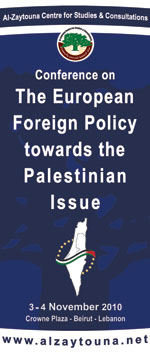
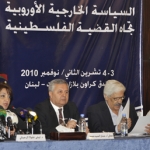
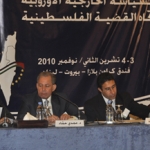
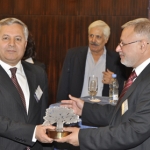
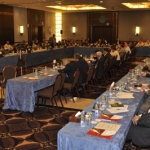
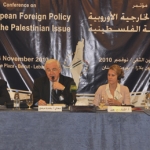
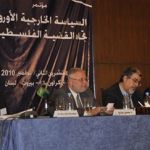
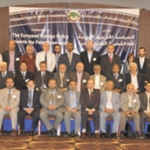
Leave A Comment